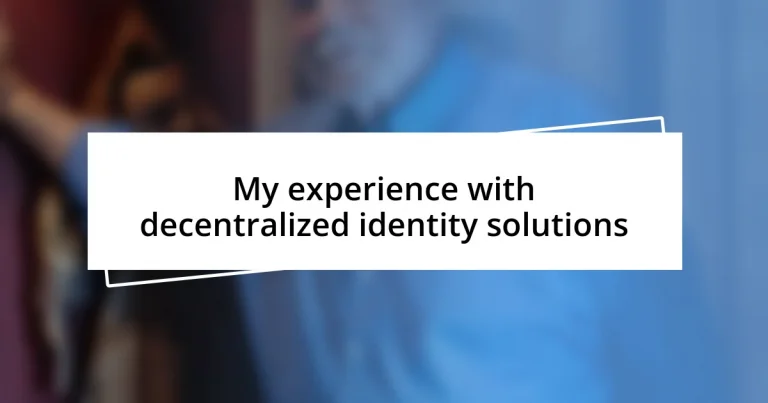Key takeaways:
- Decentralized identity empowers individuals by granting control over their personal data, enhancing security against identity theft and fraud.
- The adoption of decentralized identity tools, while revolutionary, faces challenges such as a steep learning curve and limited acceptance among organizations.
- Real-world applications, like in healthcare and travel, showcase the transformative potential of decentralized identity solutions, simplifying verification processes and increasing user control over personal information.
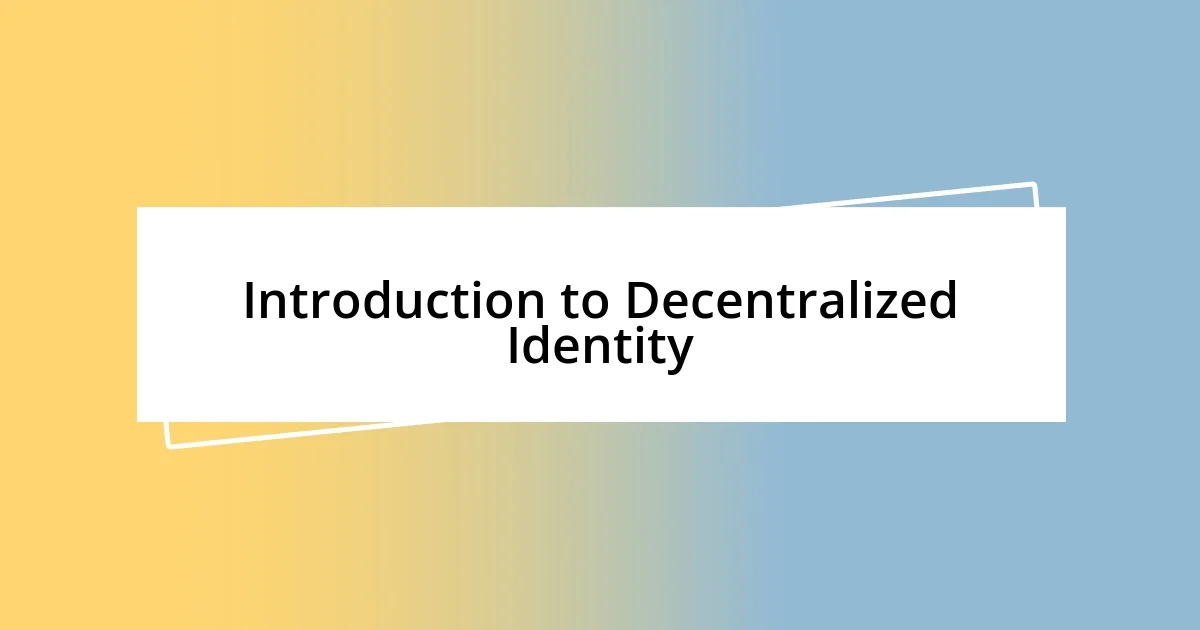
Introduction to Decentralized Identity
Decentralized identity is an innovative concept that shifts control of personal information from centralized authorities to individuals. I remember the first time I learned about it; the relief I felt knowing that my data could be managed securely without the danger of it falling into the wrong hands was profound. Have you ever thought about how much personal information you share online and who truly controls it?
At its core, decentralized identity empowers users to own their digital identities, which can significantly reduce the risk of identity theft and fraud. This transformation excites me because it fosters a more private and secure internet landscape. The idea that your identity could exist independently on a blockchain, accessible only by you, is a game-changer.
The flexibility of decentralized identity solutions also sparks my curiosity. Imagine applying for services without re-submitting all your information each time, because you control a verifiable identity that could simply link back to necessary credentials – streamlined and efficient! How liberating would that feel?
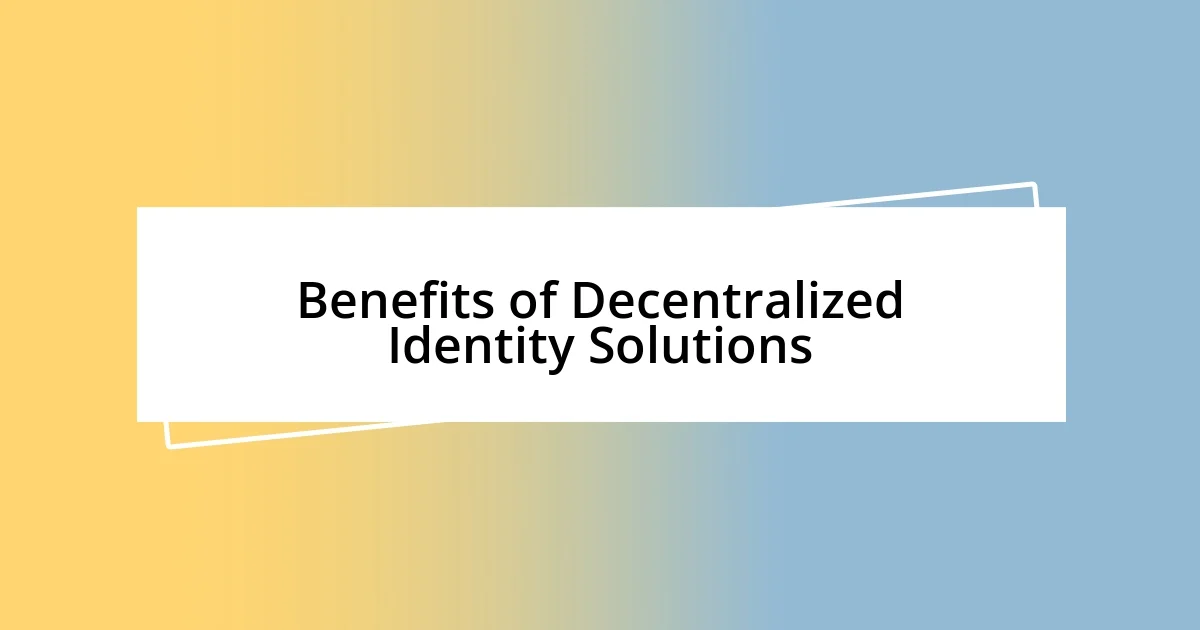
Benefits of Decentralized Identity Solutions
Decentralized identity solutions offer a remarkable sense of control over personal data. I recall the anxiety I felt navigating identity verification processes, often worrying about the security of my information. With decentralized identity, I know I can choose what to share and with whom, minimizing my exposure to potential data breaches. It’s empowering to think that my identity is mine alone, stored securely on the blockchain.
Another benefit I’ve experienced is security against identity fraud. Once, a friend fell victim to an online scam where his data was stolen and misused. It left him feeling violated and vulnerable. With decentralized identity, the chances of such incidents decrease dramatically because my credentials cannot be altered or misused without my explicit consent. This peace of mind is something I deeply value.
Furthermore, the convenience of these solutions is incredible. I vividly remember the frustration of having to fill out endless forms and verify my identity multiple times. By leveraging decentralized identity, my verified credentials are easily accessible when needed, simplifying processes like signing up for services and confirming my identity. Who doesn’t appreciate a smoother, more efficient experience in today’s fast-paced digital world?
| Benefit | Description |
|---|---|
| Control | Users maintain ownership of their personal information |
| Security | Reduced risk of identity theft and fraud |
| Convenience | Simplifies verification processes |
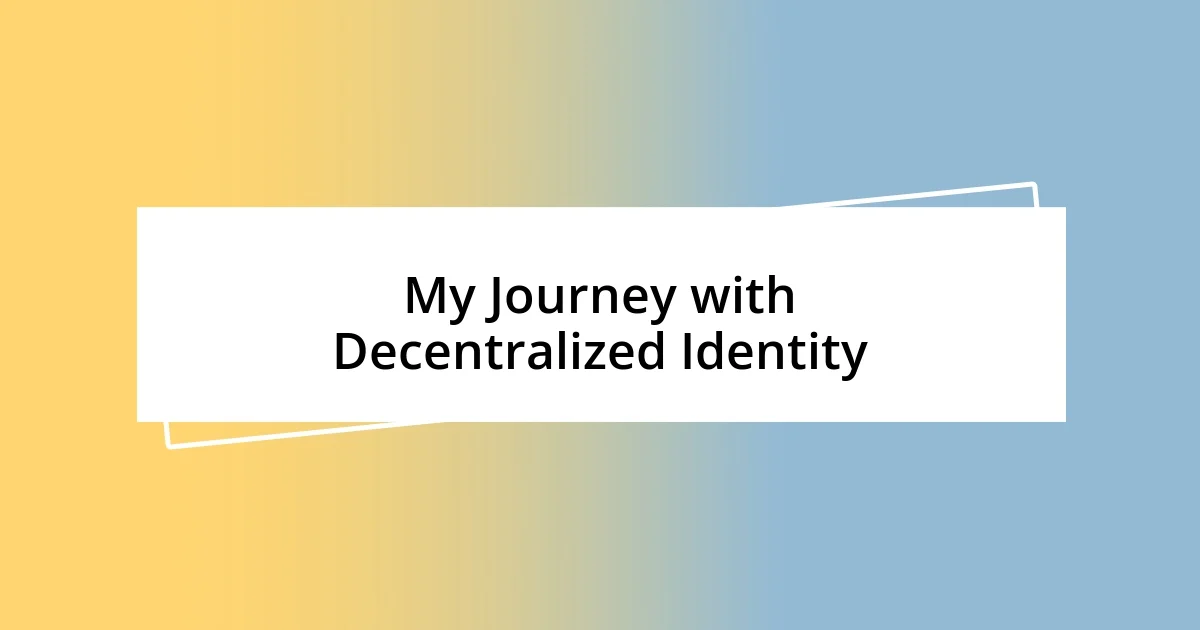
My Journey with Decentralized Identity
I’ve always been curious about how technology can empower individuals, and my journey into decentralized identity is a perfect reflection of that. I remember the moment I first set up my decentralized identifier. It felt like unlocking a new dimension of digital freedom; the ability to verify my identity without revealing unnecessary personal information was thrilling. The weight of constantly worrying about data breaches started to lift as I realized that my credentials would be securely stored on the blockchain, accessible only by me.
Reflecting on my early experiences, I was initially overwhelmed by the concept of managing my identity so independently. However, this transformation soon became a source of pride for me. I was no longer just a passive participant in the digital world—I was an active guardian of my personal data. The emotional relief that accompanied this newfound control reminded me of the time I successfully navigated a complex sign-up process for a new platform without sharing more information than necessary. It felt as if I had crossed a bridge into a safer and more personal online existence.
- First Setup Experience: The thrill of creating my decentralized identifier felt liberating.
- Overcoming Overwhelm: Initially daunting, I gradually embraced the independence of managing my identity.
- Empowered Navigation: Successfully signing up for a service without oversharing was validating and fulfilling.
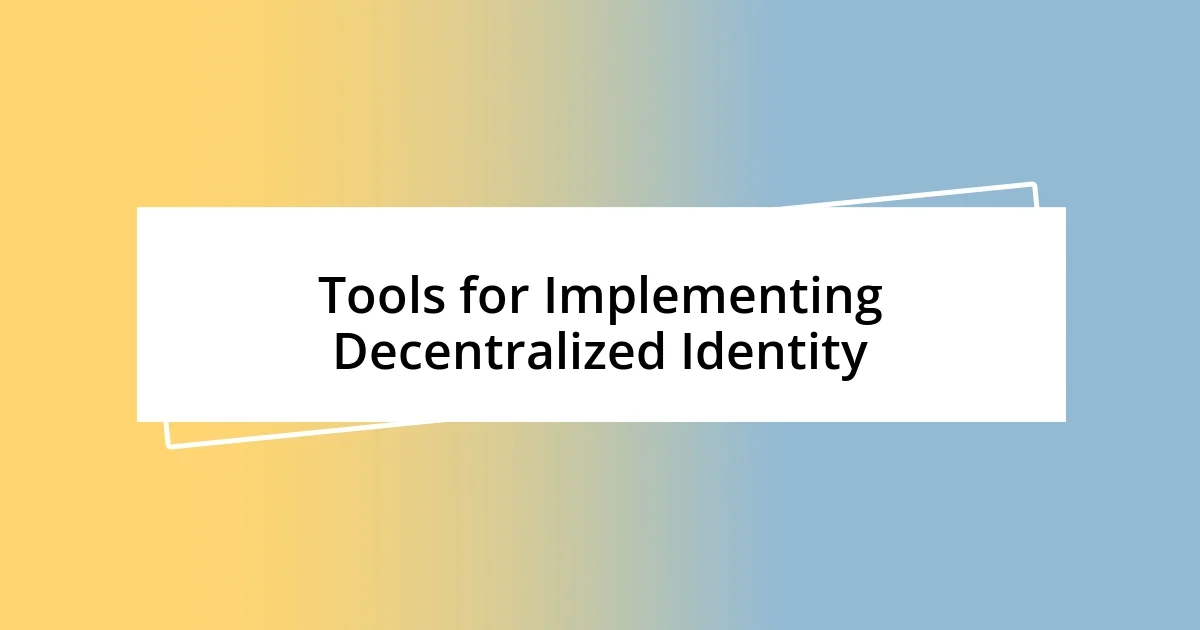
Tools for Implementing Decentralized Identity
When diving into decentralized identity tools, I’ve found solutions like self-sovereign identity (SSI) platforms particularly transformative. They enable me to create and control my credentials, dramatically simplifying how I prove my identity online. For example, when I first used an SSI wallet, it felt like holding the key to my digital life, seamlessly allowing me to share verified information without the hassle of excessive data disclosure.
Blockchain technology plays a crucial role in these tools, ensuring that my identity is secure and tamper-proof. I remember the first time I used a blockchain-based verification service; it was striking to see how effortlessly it confirmed my credentials without revealing anything beyond what was necessary. This experience left me pondering: how much simpler could daily interactions be if everyone adopted such secure systems?
Moreover, tools integrating decentralized identifiers (DIDs) have significantly changed my interactions with various services. The few minutes I spent setting up my DID compared to the countless hours wasted on traditional verification processes is astonishing. Can you imagine the relief of never having to dig through old emails for verification codes again? That’s not just convenience; it’s like a breath of fresh air in a often frustrating digital landscape.
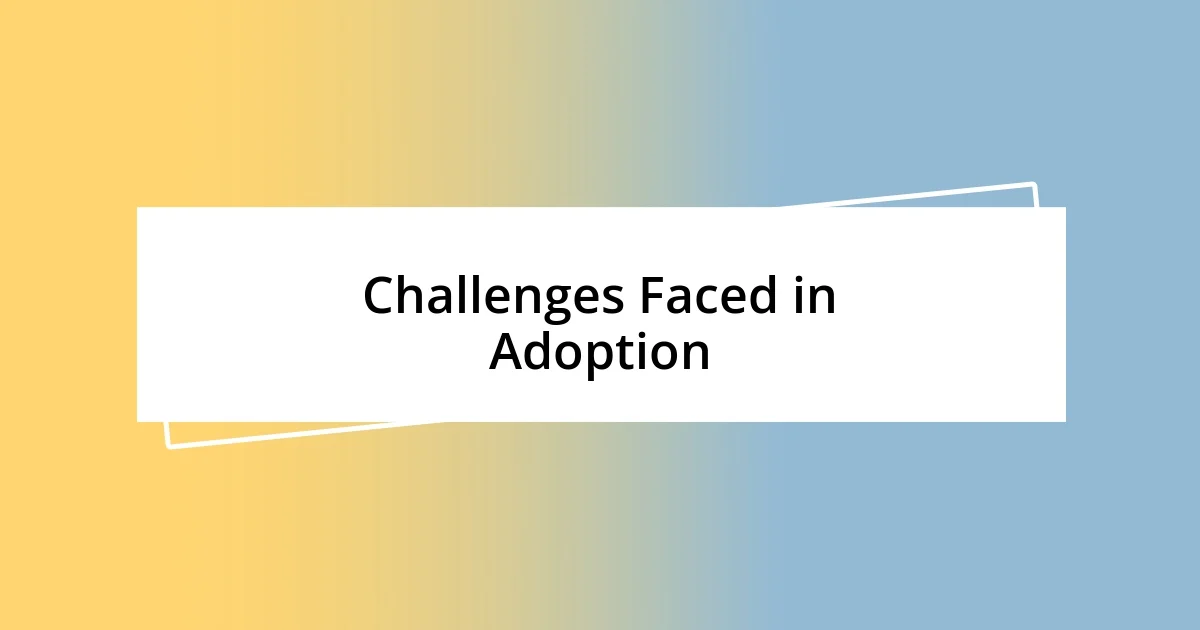
Challenges Faced in Adoption
Adopting decentralized identity solutions has not been a walk in the park. One significant challenge I encountered was the steep learning curve associated with understanding how to navigate and utilize these new technologies. At times, I felt like I was trying to understand a foreign language, and it left me wondering—would others feel the same way? I remember feeling frustrated, thinking about how many potential users might get deterred just because of complexities in setup and use.
Another obstacle is the lack of widespread acceptance among many organizations. I often faced situations where services didn’t recognize decentralized identifiers. This made me ask, how can we advocate for change when traditional systems are deeply entrenched? It was disheartening to have the tools to enhance my digital identity while others were still clinging to outdated processes. The experience reminded me of trying to introduce friends to healthy eating—sometimes it’s hard to break old habits.
Moreover, security concerns also weighed heavily on my mind. Despite the robust claims around blockchain technology, hearing about high-profile hacks and vulnerabilities had me questioning—could my data still be at risk? My peace of mind was sometimes overshadowed by skepticism about whether this innovative approach could really safeguard my identity. Balancing trust and innovation is an ongoing struggle that many of us navigating decentralized identity will face.
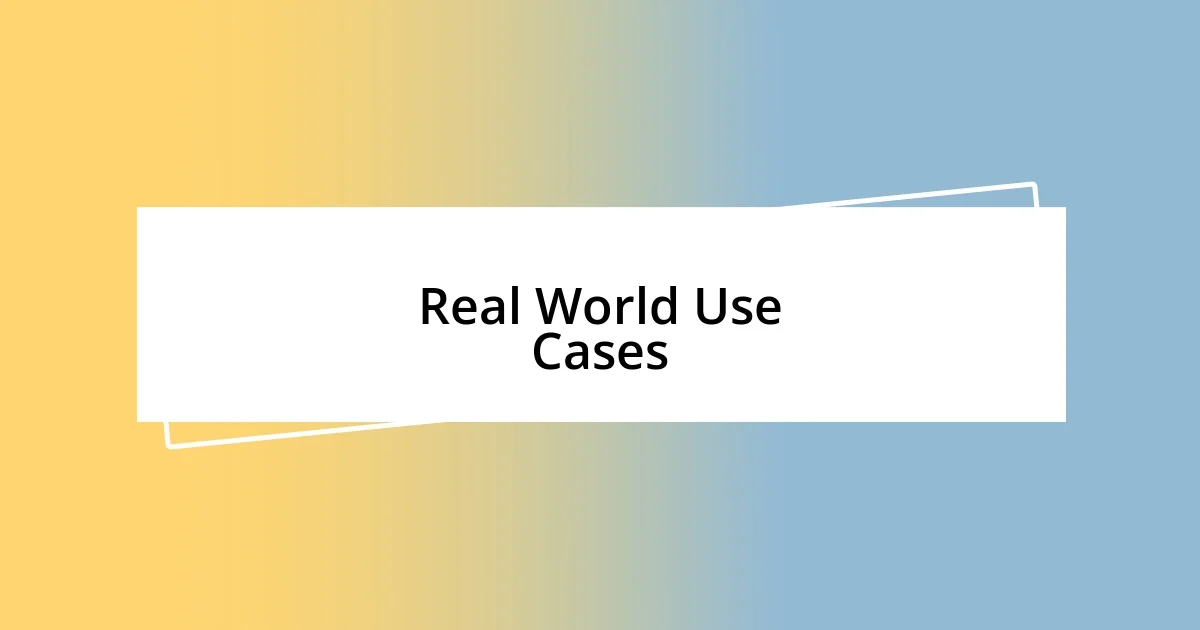
Real World Use Cases
Decentralized identity solutions are already making waves in various industries. For instance, I witnessed first-hand how an SSI platform streamlined the onboarding process at a recent tech conference. Instead of fumbling through documents, I simply shared my digital credentials with event organizers. The look of relief on their faces was palpable—no more tedious verification calls! Has there ever been a moment where technology just hit the right note for you? I felt that connection when technology transformed a mundane task into a seamless experience.
In healthcare, decentralized identities are reshaping patient interactions. The first time I used a health app that utilized blockchain for storing my medical records, I was blown away. Gone were the days of carrying around paper documents or worrying about misplaced files. It made me wonder how many patients suffer anxiety over lost or compromised medical information. With every click, I felt more in control of my health data, and I could see the potential for patients everywhere to experience that same empowerment.
Then, there’s the realm of travel. I can’t forget the moment I used a decentralized identification system at the airport. Instead of long lines and manual checks, border control scanned my digital ID with a simple sweep. It was astonishing how quickly I was through. Who doesn’t dream of smoother travel experiences? My journey seemed liberated from the usual stress; if only every travel experience could be this efficient!
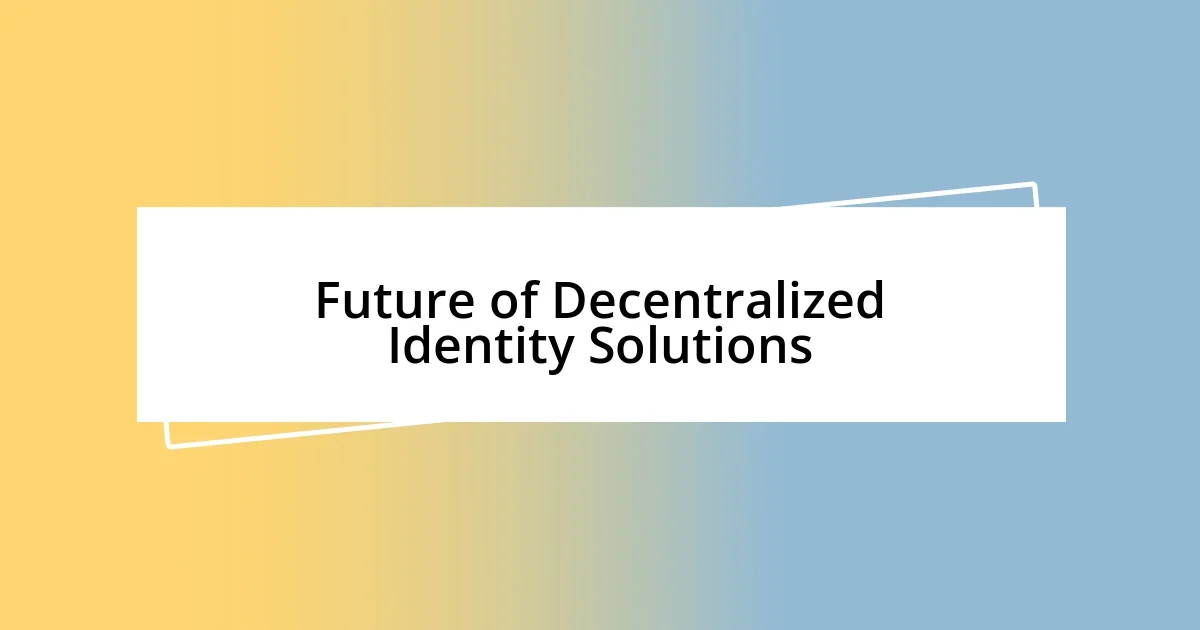
Future of Decentralized Identity Solutions
As I look ahead, I can’t help but feel optimistic about the future of decentralized identity solutions. Imagine a world where, instead of juggling countless passwords and identification methods, we can rely on a single, secure digital identity. This would drastically reduce frustration in everyday interactions, such as logging into services or proving our credentials. Doesn’t that sound liberating?
I’ve noticed an increasing number of startups investing in decentralized identity, which suggests that the momentum is building. Many innovators are identifying creative ways to integrate these solutions into existing infrastructures. I often wonder, will this innovation lead to a tipping point where traditional systems finally recognize the need for such transformative changes? It could very well be a turning point for digital identity management.
Looking even further down the line, I envision a reality where privacy rights are not just concepts but foundational principles of our digital interactions. As more users adopt decentralized identities, I believe we will collectively push for greater control over our personal data. Will that create a shift in how companies operate? It’s hard to say for certain, but I feel a sense of hope and potential in the air.












